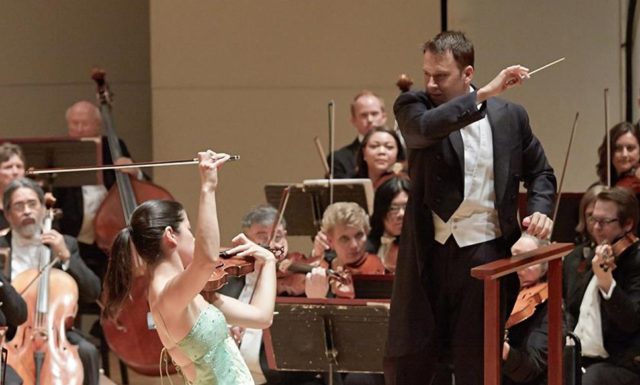
Jennifer Frautschi and Erik Ruske rarely get to perform together.
The married couple are both highly successful musicians, but she plays the violin and he plays the horn, two instruments that are not easily paired. There are only a few contemporary pieces that combine them as solo instruments, and very little outside of those newer works.
But “very little” is not the same as none. And now conductor Michael Butterman and the Boulder Philharmonic have scheduled Frautschi and Ruske to perform Ethel Smyth’s late Romantic Concerto for Violin, Horn and Orchestra on their next subscription concert, Saturday, Jan. 14 in Macky Auditorium. This will be the first time they have performed the one-of-a-kind concerto together with an orchestra.
The program, titled “Brahms & His World,” also features Brahms’s Tragic Overture and the Symphony No. 4 in D minor of Robert Schumann.
The title refers to the fact that Brahms knew both Smyth, who studied composition in Leipzig in the 1870s, and Schumann, whose family he was close to for many years. What’s more, Brahms’s influence can clearly be heard in the concerto, which was composed in 1927 but harkens back to the orchestral sounds of the 19th century.
There is another connection between Brahms and Smyth. One piece with violin and horn that is heard more than Smyth’s Concerto is Brahms’s Trio for Violin, Horn and Piano, which was performed in Longmont last May as part of the Boulder Bach Festival. This, the soloists agree, makes comparisons between the two composers inevitable.
“You hear some influence of Brahms (in the concerto), but it’s quirky,” Frautschi says. “If I were to hear this on the radio, I would have trouble identifying who it was by.”
“You might guess Elgar or Brahms,” Ruske adds. “Obviously, it’s hard to hold a candle to Brahms, but at her best there’s some really, just absolutely stunning moments.”
Butterman agrees that it is “an appealing work, one that people are not familiar with the composer but they will recognize the language. It’s a familiar style.”
The incorporation of two instruments of such apparently different characters into one concerto is a challenge for the composer, and to some extent the performers. Frautschi and Ruske solve some of the balance issues by thinking of the piece more as chamber music, rather than the typical heroic model of the Romantic concerto: Sometimes they blend into the orchestral sound, at others they stand out as soloists.
If you have heard of Smyth at all, it is likely because she was, until December 2016, the last woman to have a work produced by the Metropolitan Opera. Her Der Wald opened in 1903 at the Met, where it was the year’s highest grossing production. Nonetheless, that was the last opera by a woman produced there for 113 years.
Not that everyone loved her opera. One critic, who apparently wanted a female composer to know her place, complained that “This little woman writes music with a masculine hand … There is not a weak or effeminate note, nor an unstable sentiment.”
Smyth was active politically as well as musically. She was an ardent suffragette, whose rousing “The March of Women” was a source of inspiration to many of her generation. She fought for women to get the vote, and may be the only person to have gone from being jailed for rioting — where she led the prisoners in singing her march — to Dame Commander of the British Empire in just 10 years.
The Fourth Symphony will be the first piece by Schumann that Butterman has conducted in Boulder. “It’s a piece that I really do love,” he says, even if he hasn’t done it here before.
The symphony was written in 1841, the same year that Schumann composed his First Symphony, and revised 10 years later as his Fourth Symphony. It begins rather gloomily in D minor — which is surprising considering that it is supposed to be a portrait of his wife, Clara, whom he had just married when it was begun — but ends in a cheerful and energetic major key.
The whole symphony is based on melodic ideas that are stated at the very beginning, and transformed throughout the symphony. This technique, which was quite original at the time, may have influenced later composers, including Liszt.
“It goes from dark to light,” Butterman says. “He takes a theme and turns it whole cloth into a major key, a brighter tempo, and into a higher register, which suggests that the character has put on a new costume. It’s recognizably the same idea, the same person, but somehow in quite a different role.”
That transformation also makes the symphony a perfect concert closer. “It ends with great energy and ramping up of speed,” Butterman says. “It comes to a rousing conclusion.”
On the Bill: “Brahms and His World.” Boulder Philharmonic, conductor Michael Butterman, violinist Jennifer Frautschi, and Erik Ruske, horn. 7:30 p.m. Saturday, Jan. 14, Macky Auditorium, 1595 Pleasant St., Boulder. 2 p.m. Sunday, Jan. 15, Pinnacle Performing Arts Complex, 1001 W. 84th Ave., Denver. Tickets: 303-449-1343, choicesecure03.net/mainapp/eventschedule.aspx?Clientid=BoulderPhil














